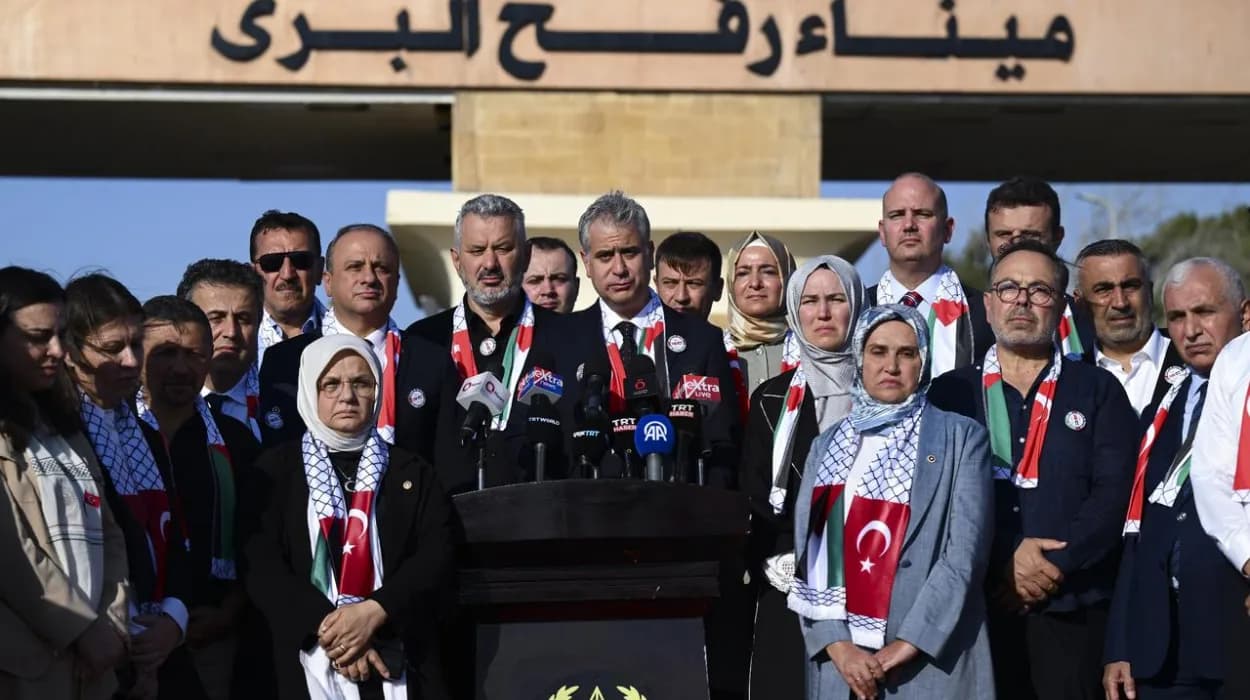A Turkish parliamentary delegation led by Hasan Basri Yalcin
visited Cairo to meet Egyptian officials before proceeding to the Rafah
Crossing on the Egypt-Gaza border to highlight the ongoing humanitarian crisis
in Gaza. The delegation condemned Israeli actions in Gaza, emphasised
humanitarian support, and called for unity among Islamic nations and
international accountability.
Turkish Parliamentary Delegation’s Visit to Egypt and Rafah Crossing
As reported by İsmail Kılıç of Turkiye Today, a
30-member Turkish parliamentary delegation from the ruling Justice and
Development Party (AKP), led by Hasan Basri Yalcin, deputy chair responsible
for human rights, arrived in Cairo and held meetings with high-ranking Egyptian
parliamentarians. Before heading to the Rafah Crossing, the delegation met
Karim Darwish, Chair of the Foreign Relations Committee of the Egyptian
Parliament, and Hazem Suleiman Omar, Chair of the Foreign, Arab, and African
Affairs Committee.
The delegation's visit, which included Deputy Foreign
Minister Nuh Yilmaz, aimed to spotlight the humanitarian crisis faced by
Palestinians in Gaza and to communicate Turkey’s steadfast support for the
Palestinian people amid Israel’s military offensive which began in October
2023.
Speech at Rafah Crossing and Accusations Against Israel
At the Egyptian side of the Rafah Crossing, Hasan Basri
Yalcin delivered a powerful speech condemning Israel’s actions in Gaza. He
labelled Israel’s military actions as “blatant genocide” and stated
the operation is not counterterrorism but an ethnic cleansing campaign against
the Palestinian population. He claimed over 62,000 Palestinians, including
20,000 children, have been killed, with tens of thousands more missing or
trapped under rubble.
Yalcin also accused Israel of destroying 80% of Gaza's
infrastructure including hospitals, schools, and mosques, and displacing 90% of
Gaza’s population. He criticized what he termed the complacency of Western
governments under the influence of pro-Israel lobby groups and stressed
that Turkey will continue supporting Palestine even if the whole world
falls silent.
Deputy Foreign Minister Nuh Yilmaz, speaking alongside
Yalcin, called on the international community to uphold its responsibility.
Yilmaz described the Israeli attacks as “crimes against humanity” and
said Turkey had severed trade relations with Israel. He urged for a ceasefire,
the lifting of the Gaza blockade, and accountability for Israeli officials
responsible for war crimes.
Egypt’s Role and Official Stance on Rafah Crossing
The visit comes amid Egypt’s firm stance that all foreign
delegations wishing to visit the border area near Gaza, including Rafah, must
obtain prior approval through official channels. As reported by Anadolu Agency,
Egypt’s Foreign Ministry reiterated that such visits must be coordinated to
ensure security and compliance with entry requirements. Egypt highlighted that
previous governmental and humanitarian delegation visits had followed these
procedures.
Egyptian political parties expressed strong opposition to
Israeli Prime Minister Benjamin Netanyahu's statements suggesting forced
displacement of Palestinians via Rafah. Parties such as the National Front Party
and Al-Wafd condemned such proposals as violations of international law and
threats to regional stability, reaffirming Egypt’s stance that Rafah remains
solely a humanitarian crossing and rejecting any plans for forced migration.
Regional and Geopolitical Implications
The Turkish-Egyptian delegation’s visit and statements
underline a broader regional alliance increasingly attentive to Israel’s
actions in Gaza. According to analyst Mustafa El-Shimi writing for Daily
Sabah, the warming cooperation between Turkey and Egypt marks a strategic
pivot in the Eastern Mediterranean. Both countries increasingly perceive Israel
as an unpredictable and destabilizing actor, especially after Gaza escalations
and Israeli strikes near Rafah undermined Egypt’s sovereignty.
The strengthening Turkey-Egypt partnership extends beyond
immediate Gaza concerns to military and political collaboration, such as
Egypt’s plans to join Turkey’s Kaan fighter jet programme. This partnership
could shift power balances in the Middle East in response to Israel’s dominance
in regional air power, supported by the United States.
Humanitarian Crisis and Diplomatic Efforts
Since the war broke out in October 2023, Gaza has faced a
blockade causing severe shortages of food, water, medicine, and fuel, with the
United Nations warning of famine risks. The International Criminal Court has
issued arrest warrants against Israeli leaders for war crimes, while Israel
faces genocide accusations at the International Court of Justice.
Both Turkey and Egypt have stepped up diplomatic efforts
seeking ceasefire and aid access. Despite a ceasefire proposal accepted by
Hamas in August 2025, Israeli forces have continued military operations
targeting Gaza City and maintaining the blockade.
Turkey reiterated calls for a two-state solution based on
1967 borders as the path forward, demanding reparations for Gaza’s
reconstruction and lasting peace. The delegation’s visit symbolises firm
regional support for Palestinians and an appeal for international intervention.
Calls for Islamic Unity and Global Action
Hasan Basri Yalcin called on the Islamic world to unite,
warning that division only aids Israel’s strategy. He urged Muslim nations to
stand in solidarity with Gaza, emphasizing that those oppressed today could be
targeted tomorrow.
The Turkish delegation’s message is clear: continued support for Gaza, condemnation of Israeli policies, and international accountability are essential for peace and regional stability. Turkey vows to maintain its humanitarian and political backing for Palestine regardless of global silence or opposition.
